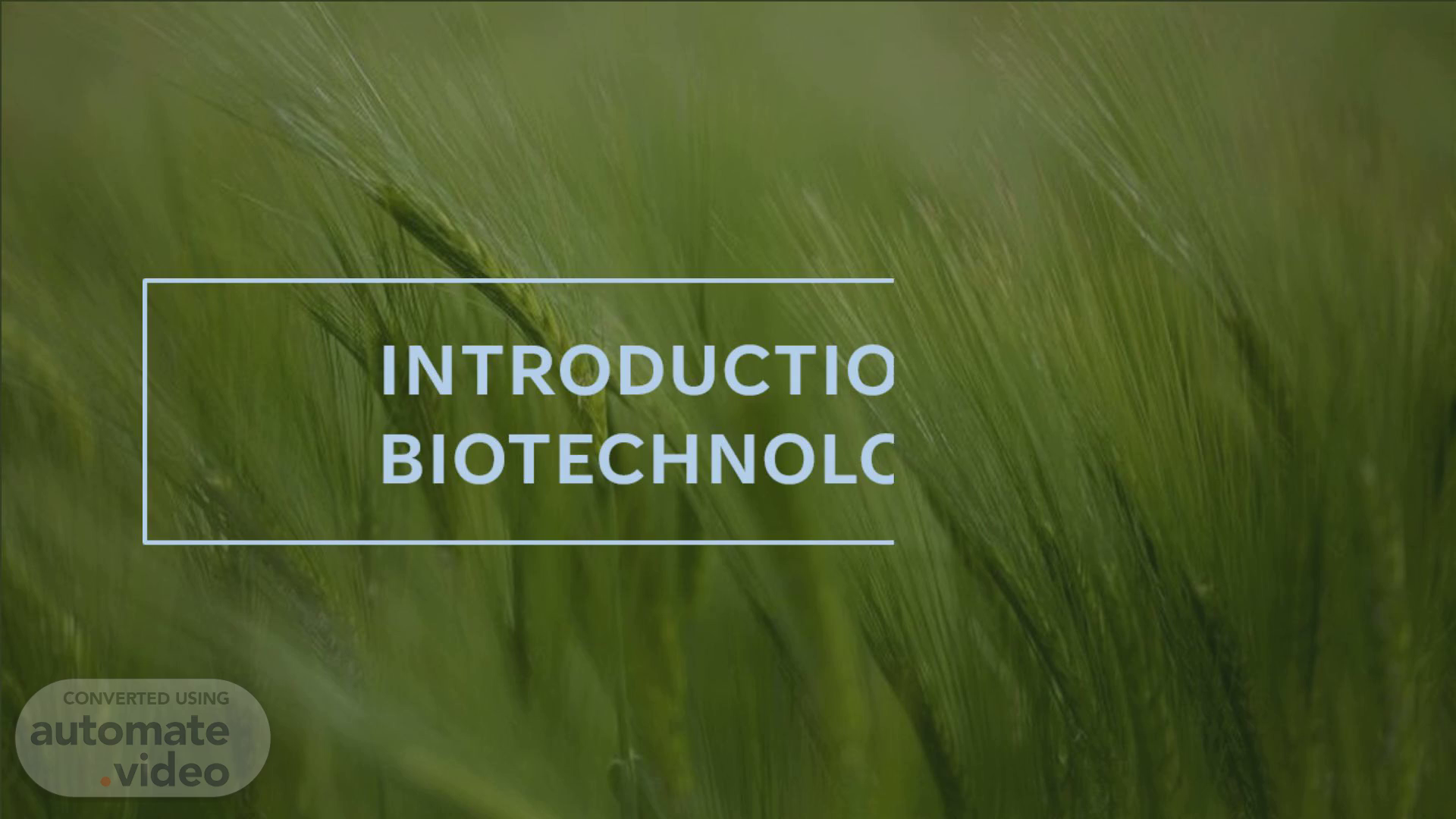Scene 1 (0s)
[image] Plan rapproch d un champ vert. Introduction to biotechnologies.
Scene 2 (7s)
This subject aims to provide a comprehensive overviewof the areas of application of biotechnology, such as: the environment, agronomy, industry, and the medical field..
Scene 3 (18s)
CHAPTERS. Introduction Biotechnology applied to environmental issues Biotechnology in agronomy and food purposes Biotechnology and industry for non-food purposes Microbial biotechnology and infectious diseases.
Scene 4 (29s)
INTRODUCTION. The origins of biotechnology The evolution of biotechnology over time The major challenges currently facing biotechnology and bionanotechnology Definition of green, white, and red biotechnology typical biotechnology products industrial Sectors involved the challenges of biotechnology innovation.
Scene 5 (43s)
Definition: Biotechnology is a field that includes all technologies and applications that use or modify living materials for scientific research purposes to increase human knowledge, or for commercial purposes to create a product or service..
Scene 6 (56s)
Biotechnology is the result of a marriage between the science of living beings—biology—and a set of new techniques from other disciplines such as microbiology , biochemistry , genetics , molecular biology, etc..
Scene 7 (1m 8s)
Red biotechnology /medicine:. 7. All biotechnological uses related to medicine ... Production of vaccines and antibiotics, Development of new drugs, Molecular diagnostic techniques , Regenerative therapies and the development of genetic engineering to cure diseases through genetic manipulation..
Scene 8 (1m 22s)
White biotechnology:. White biotechnology (also known as industrial biotechnology) is a special category of biotechnology. They relate to industrial processes. Their aim is to produce biochemicals, biomaterials and biofuels on a sustainable industrial scale from renewable resources..
Scene 9 (1m 36s)
*Yellow biotechnology: All biotechnology applications directly related to the environment. These applications can be divided into two main branches: the maintenance of biodiversity and the elimination of contaminants..
Scene 10 (1m 48s)
Green biotechnology. Focused on agriculture as a field of work: approaches and applications include the creation of new plant varieties of agricultural interest. *Blue biotechnology based on the exploitation of marine resources to create products and applications of industrial interest..
Scene 11 (2m 3s)
*Blue biotechnology. based on the exploitation of marine resources to create products and applications of industrial interest..
Scene 12 (2m 12s)
Biotechnology products. Fields of application for biotechnology: Agronomy and food industry b. Industry c. Health care d. Environment.
Scene 13 (2m 23s)
Agronomy and agri-food sector insect resistance disease resistance herbicide resistance nutritional qualities and feeding fruit maturation.
Scene 14 (2m 32s)
B. Industry sector 1-paper paste 2-industrial oils 3- colorants.
Scene 15 (2m 40s)
C. Health sector 1-blood products 2-vaccines 3-human proteins.
Scene 16 (2m 48s)
D. Environmental sector 1-herbicides with a favorable ecotoxicological profile 2-reducing the use of insecticides 3- enhance the plant heritage ????.
Scene 17 (2m 58s)
biotechnology innovation challenges. Biotechnologies are driving cultural and social change: Changes in the way we live, Health care and the way we deal with old age, Changes in agricultural and industrial production methods, Changes in the way we think about protecting the environment, and changes in the way we eat. BIOTECHNOLOGY IS A TOOL, NOT AN END..
Scene 18 (3m 17s)
Biotechnology gives rise to particular ethical issues for one obvious reason: It confers on man unprecedented powers over living organisms. Like all progress, biotechnological advances are multifaceted. It's important that we rise to the challenge of biotechnology, both in terms of its promise and its potential risks..
Scene 19 (3m 33s)
Genetically modified organisms (GMO) in agriculture and food are subject to health and environmental risks. As far as food is concerned, only minor risks, such as allergies, have been identified..
Scene 20 (3m 46s)
The environmental risk of plant GMO is better understood. This is the risk associated with the unintentional dissemination of genes from genetically modified crops to other crops and, above all, to the biosphere. Scientists also point to other risks, such as damage to biodiversity..
Scene 21 (4m 2s)
The ethical issues raised by human genetics and biology involve fundamental values: Human cloning, Germ-line modification at the embryonic stage, Pre-implantation diagnosis to choose the sex of the future child.
Scene 22 (4m 14s)
With so much at stake, it's understandable that biotechnologies applied to human beings should provoke so much philosophical debate and political controversy. Because they're an ethical issue :Human genetics concerns the very future of our species. FOR THE FIRST TIME, MAN IS BECOMING MAN'S ENGINEER..
Scene 23 (4m 30s)
THANK YOU. [image] Gros plan d une feuille.
